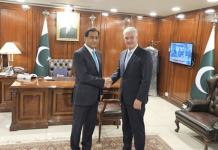LISBON (DNA) -Mário José Gomes de Freitas Centeno (born 9 December 1966) is a Portuguese economist, academic and politician who has served as Minister of Finance since November 2015. He was elected president of the Eurogroup on 4 December 2017, for a mandate which will begin on 13 January 2018. Previously, he was a board member economist of the Bank of Portugal.
Education
Centeno graduated in Economics by ISEG-Technical University of Lisbon in 1990, he has two Masters – the first one in Applied Mathematics, by ISEG-UTL in 1993, the second one in Economics, by Harvard University, USA, in 1998 – and a PhD in Economics, by Harvard University, USA, concluded in 2000.
Early career
An expert on labour market issues, Centeno joined the Banco de Portugal in 2000, where he worked as an economist until 2004. He was member of the Executive Committee of European Association of Labor Economists (EALE) from 2003 to 2005.
From 2004 to 2013 he was assistant director of the Central Bank Economics’ Department. He was member of the Economic Policy Committee of the European Commission between 2004 and 2013.
He also directed the Macroeconomics Statistics Development’s work group in the Superior Statistics Council (CSE) between 2007 and 2013.[2]
From 2014, Centeno was Professor at ISEG, University de Lisboa, and worked as a consultant to the Central Bank. In addition, he served as the main economic policy advisor to Socialist leader António Costa, coordinating the Socialist economic programme before the 2015 elections.[3]
Completely unknown to the public at the time he entered government, Centeno had a reputation for economic liberalism in academic circles because of his positions in favour of greater labour market flexibility.[4] He is author and co-author or several scientific publications, books and book chapters related to his areas of interest, such as Labour Economy, econometrics, microeconomics and contract theory.[5]
Political career
Since taking office as Finance Minister, Centeno has enacted policies which reversed some austerity policies from the debt crisis, such as raising public pensions and wages to increase households’ disposable income, while insisting that European budget rules must be respected.[6] Early in his tenure, he urged the EU to acknowledge the scale of Portugal’s economic turnround as the country headed towards its lowest fiscal deficit in more than 40 years and to remove Portugal from the group of countries subject to penalties for breaking the European Fiscal Compact.[7] By the end of 2017, national opinion polls placed Centeno as the best-known and best-liked minister.[8]
In November 2017, Centeno submitted his formal application for succeeding Jeroen Dijsselbloem as the next chairman of the Eurogroup.[9] On 4 December 2017, he was elected President of the Eurogroup, incumbent from 13 January 2018.
Reportedly favored by an informal agreement between French President Emmanuel Macron and German Chancellor Angela Merkel,[10] he defeated Pierre Gramegna of Luxembourg, Peter Kažimír of Slovakia and Dana Reizniece-Ozola of Latvia.[11] His election carried particular symbolic weight because he is from one of the countries hardest hit by the debt crisis.[12] He will serve a two-and-a-half year term.
Personal life
Centeno married one of his co-students from ISEG and has three children.
As a student, Centeno played rugby for the economics faculty.[22] He is a keen soccer enthusiast and supports Lisbon club Benfica. He wore a Portugal soccer scarf to the first Eurogroup meeting after his country won the European championship in 2016.











